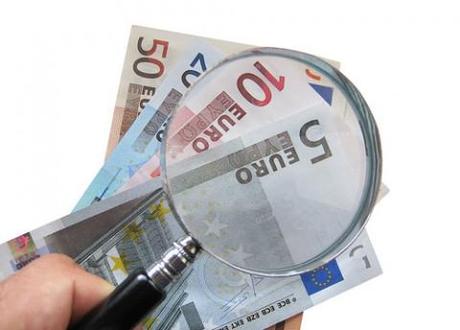
Looking carefully at the Euro. Photocredit: Images of Money http://www.flickr.com/photos/59937401@N07/5930025654/sizes/m/in/photostream/
So what’s up with the eurozone? Ah, nothin’. Hold on – that was a joke. The economic turmoil continues, though there are some signs of positive action. Greece is on its way to appointing Lucas Papademos as an interim leader – and he’s a proper economist, having been a vice president of the European Central Bank. In Italy, it looks likely that Mario Monti, an erstwhile European commissioner, will take the reins after Silvio Berlusconi steps down. The Italian senate are about to vote on austerity measures in order to avoid a bailout. Standard & Poor, the ratings agency, have “accidentally” downgraded France’s credit rating, the sillies (though they’ve corrected it now), whilst Spain’s economy is reporting zero growth. Former Prime Minister Gordon Brown has even entered the fray, suggesting that France will be the next country to be hit.
Meanwhile, there are reports of suggestions that a “two-speed Europe” might be created – a “union within a union” said Bruno Waterfield in The Daily Telegraph, with stronger European countries having their own treaties and a parliament. The markets, at least, are calmer, and have stopped acting like a crazy horse for the moment, at least, with the FTSE 100 up 0.9 per cent.
So is there any way out of this Euromess?
Come on Germany! We should look to Germany, said a leader in The Times, to hold up the European Central Bank and preserve the euro. What we’re looking at is “terrifying” – it’s not just householders who can’t pay the bills, but “entire countries.” The most important person is not Papademos or Monti, but Mario Draghi, the new President of the European Central Bank (ECB) – and he looks like he knows what he’s doing. But he’s not doing enough. “Monetising” debt – “expanding the money supply” – is what he should do, despite the possibility of inflation. In choosing between “inaction and inflation”, Germany must choose the latter, and let loose the ECB.
The gods are angry. Hardly anyone understands what’s going on, said Simon Jenkins in The Guardian. It’s like watching Icarus fall – we “sense the gods are angry but return quietly to the plow.” Now, a “50-year fiction is over.” We have to get used to the idea that a from the ruins of old Europe, a new one will rise. The irony is that what it now seeks is precisely what it wanted to avoid – “German supremacy.” But Germany doesn’t want political domination – so it can’t enforce it. The euro is a “tragedy”, causing “mass economic destruction.” Political union is now “discredited.” Southern Europe must write off its debts and devalue its currencies, and then the others can find equilibrium. It’s not about being a “two-speed” Europe – it just needs a new constitution. But that’s easier said than done. What mustn’t happen is enforcing German “discipline” on the weaker countries. Fortunately, the catastrophe so far has been economic – but that “could yet be a near-run thing.” Yikes – is the threat of war upon us?
End the euro! Daniel Johnson in The Daily Telegraph agreed, adding that its the “spectre of German domination” that is preventing them from acting. But it’s nonsense to suggest that Germans want to return to their “militaristic Prussian past.” Its own political culture is preventing it from bringing about a solution. The solution is that there should be a “looser relationship” with other countries, allowing reinstated national currencies that find their own value. “The end of the euro need not mean the end of Europe.”
Rise of the technocrats. Rachel Donadio in The New York Times said that now it’s up to the technocrats – Papademos and Monti – to “dislodge” the entrenched cultures that created “slow growth” in Italy and Greece. Though there are similarities between them, as both new governments will have to instil many new measures in a very short space of time, Greece is bust, needs a strong hand and is antagonistic to the EU; in Italy, the mood is better, since though it’s in debt, it’s got assets, and is used to looking for help from outside influences.

